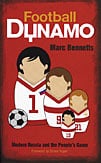 Modern Russia and the People's Game
Modern Russia and the People's Game
by Marc Bennetts
Virgin, £11.99
Reviewed by Csaba Abrahall
From WSC 259 September 2008
Russia’s impressive showing at Euro 2008, following recent UEFA Cup victories for CSKA Moscow and Zenit St Petersburg, was the latest indication that Russian football, after a long period of post-Soviet underachievement, is emerging into an era of success. Marc Bennetts’ affectionate analysis of football in modern Russia is therefore a timely one.
It is not a pretty picture, as tales of corruption, political interference, violence, racism and financial inequity unfold. The authorities’ blasé attitude towards corruption is astonishing. Overwhelming anecdotal evidence and the testimony of a wide range of significant interviewees leave little doubt that results are frequently arranged, even if no one openly admits to being involved. Bennetts observes that corruption is seen as “just another factor, like home advantage and recent form” in deciding games.
That no conclusive evidence of wrongdoing has been found is unsurprising since, as Bennetts reports, the official investigation into the allegations consisted of a study of three matches around which there had been no controversy anyway. The suggestion is that results are fixed to suit “political forces looking to use the game for their own ends” – Bennetts persuasively details suspicions that the 2004 Russian Cup victory of Chechen side Terek Grozny was “a Kremlin propaganda device” designed to demonstrate that stability had returned to the war-torn region.
Bennetts draws convincing parallels between football and the state of the country itself. The hooliganism that blights the game (and, it is suggested, has been funded and provoked by the authorities) is seen as a reflection of an inherently violent society, a modern equivalent of Stenka na Stenku, a traditional pastime in which young people from neighbouring areas would meet up to beat each other into a pulp. The blatant racism at Russian clubs is attributed to black faces being almost completely absent from the country; while the money-fuelled success of the leading clubs that makes Russian football “nothing more than a battle between oligarchs” mirrors the widening gap between the country’s deprived provinces and increasingly affluent cities.
Bennetts’ narrative occasionally seems disjointed, and the book loses momentum with chapters on Andrei Kanchelskis and Lokomotiv Moscow flop Garry O’Connor, which offer little aside from token British interest. The uplifting denouement redresses the balance, with the Russia team seeing off England and qualifying for Euro 2008. This was unexpected success for a nation that has adopted as a motto ex-Prime Minister Viktor Chernomyrdin’s comment that: “We hoped for something better, but things turned out like they always do.”
Arsène Wenger has predicted that a Russian side could win the Champions League within a decade and, while oil prices continue to rise, prospects look good, with handsomely paid foreign players seemingly having a positive influence on both clubs and the national side. However tainted the resurgence, it has captivated Bennetts, who feels that chaos and anarchy are integral and essential parts of the game, just as they are of the country. His enthusiasm for it has resulted in a book that is an enthralling insight into a rejuvenated football nation.